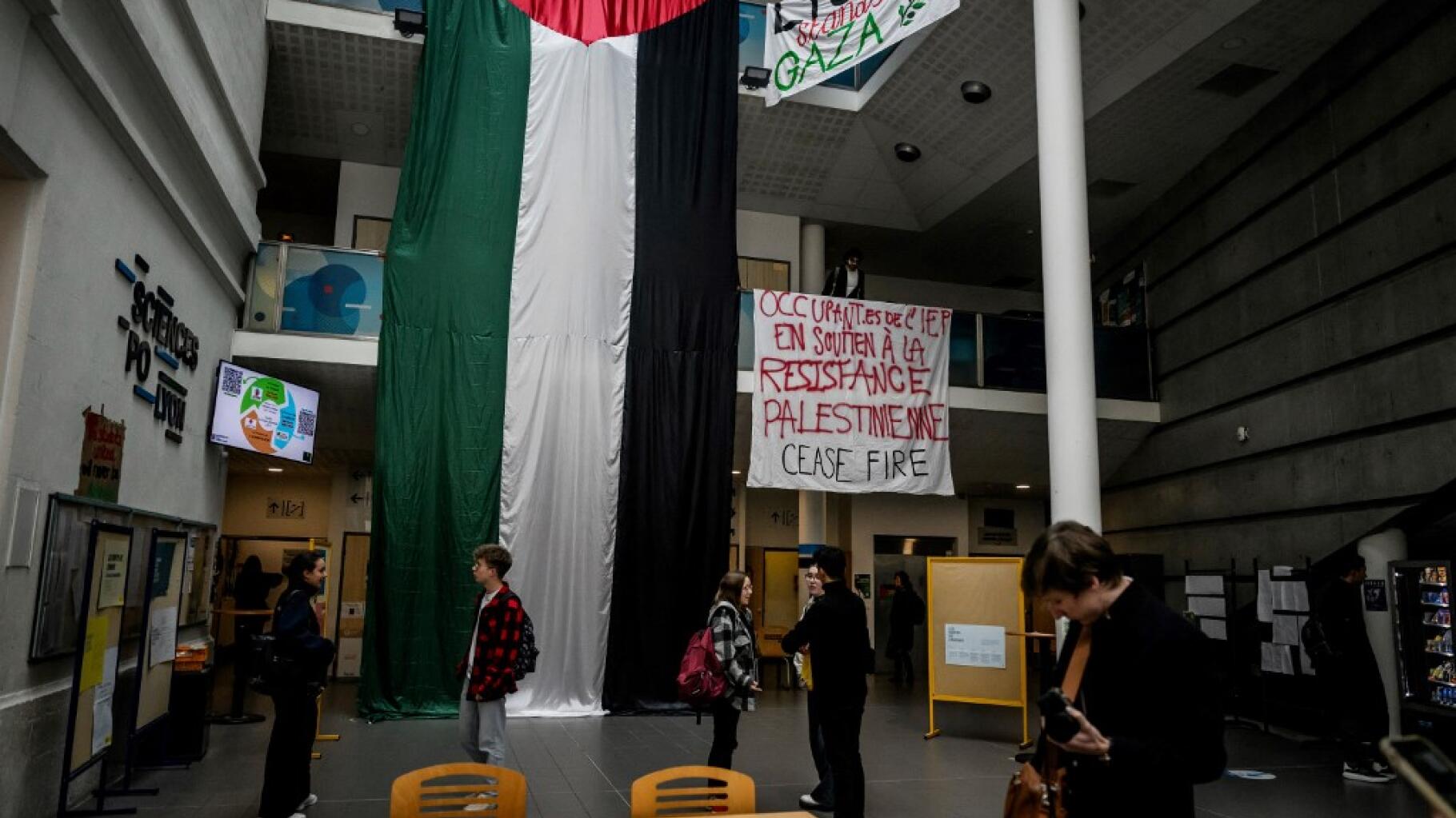JEFF PACHOUD / AFP
Illustrative photo taken at Sciences Po Lyon, May 2, 2024.
POLITICS – For the second time in less than ten days, this Friday, May 3, the police intervened at Sciences Po Paris evict several dozen pro-Palestinian students who occupied the premises. This, while the movement affects some other university places, such as La Sorbonne, the ENS campus in Paris and even journalism schools.
Compared to the American scale where the campuses of forty universities are experiencing a wave of mobilizationwith the muscular interventions of the police, the situation in France remains measured outside the Sciences Po campus in Paris and in the region.
The executive branch, however, shows its own “firmness”. “There will never be a right to block and there will never be tolerance towards the actions of an active, dangerous minority, which wants to impose its rules, ideology from across the Atlantic, on our students and professors,” launched the prime minister trip to Pirou (Manche) April 27. Gabriel Attal closely follows the matter and has “requested intervention (of the police, op.a.) as soon as the temporary manager was requisitioned” from Sciences Po Paris, Matignon explained on May 3, to put an end to the new series of blockages.
Before Gaza, Vietnam (and not only in the United States)
In fact, seeing students mobilize in the context of international conflict is nothing new. Near by HuffPost Robi Morder, president of GERME (Group for Research and Research on Student Movements) and associate researcher at Laboratoire Printemps, discusses the mobilizations against fascism in the interwar period, but especially those against the Vietnam War (1955-1975).
In March 1968, students occupied the faculty in Nanterre and started ” Movement on March 22 “, AND “detonator” May 1968, for historian Michelle Zancarini-Fournel. The demands of time are varied but “the first was the release of an activist from the Vietnam Committee (CVN) who was arrested a few days ago”the historian explained On World in 2018
It is also impossible not to mention the Algerian war and the large demonstrations launched by UNEF on October 27, 1960. However, with an important difference: France was then directly involved, which is not the case in the Israeli-Palestinian conflict. In addition, the abolition of the military deferment (order of August 11, 1959) which applied to students who could be sent to the battlefield, was an additional reason for gathering in the sixties.
“The mobilization of students in international conflicts is nothing new. But every time we have to ask ourselves why this is done in some conflicts and not in others. summarizes Robbie Morder.
The struggle against colonialism, the mobilizing element
If the mobilization of students for the Algerian war is not entirely comparable to that for the Palestinian cause, there is nevertheless a point in common: the fight against colonialism, the French for Algeria in the 1950s, the Israeli for the current conflict in the Middle East. At the end of 2023, the Israeli NGO PeaceNow identified about 146 official Israeli settlements in the West Bank, plus at least as many settlements that are not recognized by the Israeli administration. This one, completely violating dozens of resolutions passed in the UN since the end of the Six Day War.
Messages “once a settler, always a settler” they are marked that way at certain institutions, while this Friday the USL high school union called “mobilization in institutions for a cease-fire in the Gaza Strip, recognition of the Palestinian state and the end of colonization” .
The fight against colonialism works as “phenomenon of identification”deciphered by Robbie Morder. “Obviously, any anti-colonialist struggle that emerges as such is likely to interest many students who, for reasons of background or opinion, are attached to this issue.” And to cite, as a counter-example, the case of the war in Ukraine where this aspect was not imposed, due to territorial proximity on the one hand, but also representation in the collective imagination of colonization: against the people “different skin colors or religions”which is not the case in Ukraine.
“Heart movement” for the “broken”
“The student population has always shown an outpouring of heart and always for the downtrodden, rarely for the authoritarian.” criminal lawyer Henri Leclerc abounds at France Inter. “What is happening in Gaza is something that is shocking. No one disputes that October 7 is an absolute horror, that it is a barbaric act (…) but the answer is terrible”confirmed the honorary president of the League for Human Rights at France Inter, evoking a “heart movement”.
In addition to the fight against the policy of colonization, Robi Morder also points out a “specificity” from Sciences Po where, due to its status as a political studies institute, the Israeli-Palestinian conflict and its repercussions are among the topics studied. “Students are therefore particularly sensitive to it”notes that experts and communication or awareness-raising operations carried out by students from cooperating countries have more resonance.
However, unlike in the United States where the demands directly question Joe Biden’s policy towards Israel, in France they are not limited to the higher education sector. Thus, at Sciences Po Paris, the blockade of the institute was lifted on the evening of Thursday, May 2, and about ten students began a hunger strike after the administration refused to launch an internal investigation to review the partnerships between the Paris school and Israeli institutions.
See also HuffPost:
